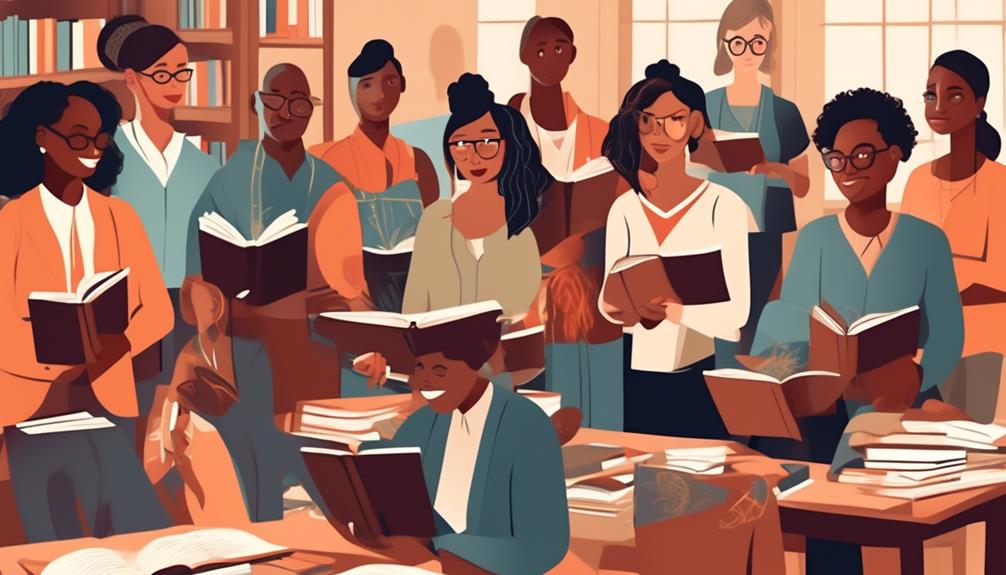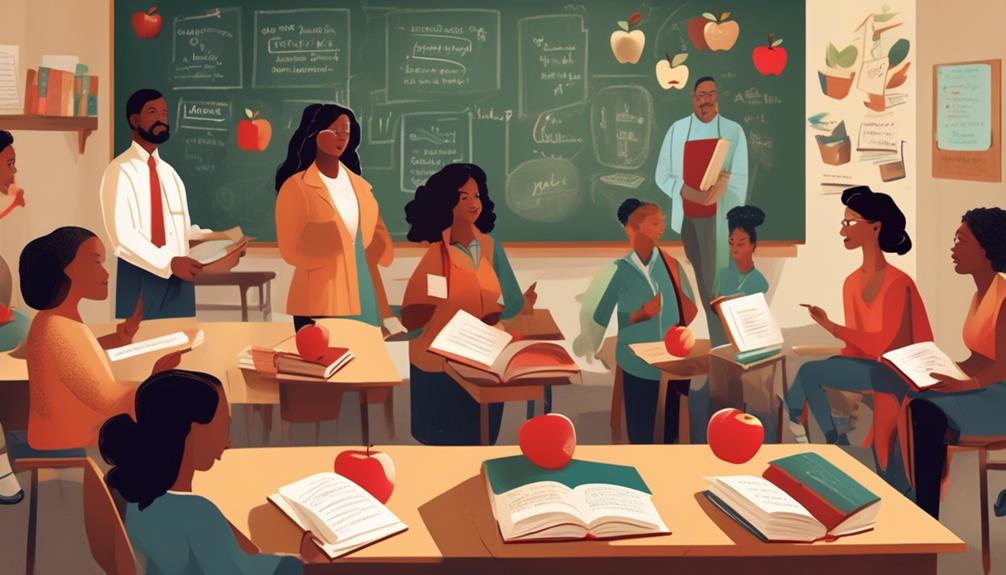Observe the intriguing world of collective nouns, as we unveil the unexpected term for a group of teachers.

The Collective Noun for Teachers
Navigating the English language can sometimes feel like walking through a maze, full of unexpected twists and turns. You’re familiar with collective nouns, those special words we use to describe a group of people, animals, or things.
You’ve heard of a ‘murder of crows’, a ‘pride of lions’, and even a ‘gaggle of geese’. But have you ever stopped to consider what we call a group of teachers? It’s not a question that comes up in everyday conversation, yet, interestingly, there is a unique term for it.
Now, wouldn’t you like to know what it is?
Key Takeaways
- Collective nouns describe a group or collection of people, animals, or things considered as a whole.
- Collective nouns originated in the Middle Ages and were created by English hunters to define groups of animals.
- The collective noun for a group of teachers is ‘faculty’, representing a body of educators working towards a common goal.
- ‘Faculty’ is commonly used in educational settings, especially in colleges and universities, but ‘staff’ can be used in a more informal context.
Understanding Collective Nouns

To truly appreciate the term ‘faculty’ as a collective noun for teachers, you need to grasp the concept of collective nouns and their unique role in English language. Collective nouns are words used to describe a group or collection of people, animals, or things considered as a whole. They’re not merely clusters, but units with their own identity. They’re an integral part of English, bringing a certain cohesion and unity to sentences.
Think about words like ‘flock’, ‘team’, or ‘pack’. They don’t just signify multiple individuals, but a group acting as one. The beauty of collective nouns is their ability to convey this unity in a single word, adding depth and specificity to your sentences.
Now, let’s focus on ‘faculty’. This term doesn’t just denote a bunch of teachers. It encapsulates a body of educators working collectively towards a common goal – education. It’s a term that encapsulates unity, cooperation, and shared purpose. So, understanding collective nouns isn’t just about language mechanics; it’s about appreciating the nuances and richness they add to our language.
History of Collective Nouns
Delving into the history of collective nouns, you’ll find a rich tapestry of language evolution that dates back to the Middle Ages. These terms, originally crafted by English hunters to define various groups of animals, were a testament to the precision and elegance of the English language. They were considered a mark of cultured conversation and were widely used in literature.
By the 15th century, books known as Books of Courtesy started to document these collective nouns, preserving them for future generations. These books functioned as etiquette guides, detailing the ‘correct’ collective nouns to be used among the educated class. It’s from these books that we’ve inherited terms like a ‘murder of crows’ or a ‘parliament of owls’.
However, the relevance of collective nouns transcends beyond historical usage. They’re still prevalent in modern language, signifying the dynamism and adaptability of English. They offer a fascinating glimpse into societal norms and cultural perceptions of the time they were coined.
The Correct Term for Group of Teachers

Drawing from this rich linguistic heritage, you might wonder what the correct term is for a group of teachers. Well, let’s unravel that mystery for you.
The collective noun for a group of teachers is a ‘faculty.’ You’ve probably heard this term used in educational settings, especially in colleges and universities. This term is used to represent a group of educators working together towards a common goal, often within the same institution.
However, it’s important to note that the term ‘faculty’ isn’t exclusive to teachers. It’s also used to denote a group of professionals in other fields, like medicine or law. In a broader sense, it’s used to represent a body of individuals who impart knowledge or skills.
In a more informal context, you might come across the term ‘staff’ which is used to refer to a group of teachers, but it also includes non-teaching personnel like administrators and support staff.
Usage in Context: Examples

While you’re likely familiar with the term ‘faculty,’ understanding how it’s used in context can provide clearer insight into its meaning and application. ‘Faculty’ is often used when referring to a group of teachers in a school setting, particularly in universities. For example, you might hear, ‘The faculty of the history department held a meeting to discuss curriculum changes.’
However, it’s not limited to higher education. You can also use ‘faculty’ in relation to a group of teachers at a primary or secondary school. Consider this sentence: ‘The school principal had a meeting with the faculty to discuss the new grading policies.’
Remember that ‘faculty’ isn’t just about the teachers but also encompasses other educational staff, like instructors, lecturers, and administrators. For instance, ‘The faculty at XYZ University includes renowned professors, dedicated lecturers, and supportive administrators.’
It’s important to note that the term ‘faculty’ is more commonly used in American English. In British English, ‘staff’ is more frequently used. The usage largely depends on the region, the educational system, and the context.
Fun Facts About Collective Nouns

You might find it intriguing to learn that the English language is peppered with a multitude of collective nouns, each uniquely suited to describe specific groups, and not just for people, but also for animals, objects, and ideas. From a ‘pride’ of lions to a ‘murder’ of crows, these terms paint vivid pictures in our minds, adding richness to our verbal and written communications.
Interestingly, these collective nouns aren’t random choices. They often reflect the characteristics or behaviors of the group they describe. For instance, a ‘gaggle’ of geese refers to the noisy, chaotic nature of these birds when they’re together. Similarly, a ‘parliament’ of owls echoes the perceived wisdom associated with these creatures.
Moreover, collective nouns aren’t static. Language evolves, and so do these terms. New collective nouns can emerge, and old ones can fall out of usage. For instance, you may know a group of teachers as a ‘faculty’, but have you ever heard of a ‘quiz’ of teachers? It’s not common, yet it’s an official term.
Frequently Asked Questions
What Are Some Other Collective Nouns for Professionals Outside of Teaching?
Sure, you’re interested in collective nouns for other professions.
A group of doctors is called a round, while a collective of chefs is a staff.
For musicians, we use band or orchestra. A company refers to actors, and a panel is used for judges.
If you’re talking about sailors, it’s a crew.
Each profession carries its own unique collective noun, reflecting the nature and dynamics of the work they do.
How Do Different Languages Handle Collective Nouns?
Different languages handle collective nouns in varied ways.
In English, you have unique words like ‘flock’ for birds.
Spanish, on the other hand, often uses a base noun plus a modifier. For example, ‘manada de lobos’ for a pack of wolves.
In Japanese, there are counters for specific categories of objects.
Are There Any Collective Nouns That Are Specific to Different Types of Teachers (E.G. Music Teachers, Math Teachers)?
You’re asking if there are collective nouns specific to different types of teachers, like music or math teachers. While there’s a general collective noun for teachers, which is a ‘faculty,’ there aren’t typically specific collective nouns for different specialties.
It’s more common to simply use a phrase like ‘a group of music teachers’ or ‘a team of math teachers.’ Language doesn’t often get that specific with collective nouns.
What Is the Process for a New Collective Noun to Be Officially Recognized?
To get a new collective noun officially recognized, you’d need to use it widely and consistently so it becomes common usage. It’s all about acceptance by the language community.
There’s no official governing body that approves new words. Instead, dictionary editors monitor language use and when they see a word used frequently, they may add it to their dictionary.
Why Do Certain Professions Have Specific Collective Nouns While Others Do Not?
Certain professions have specific collective nouns due to historical, cultural, or practical reasons. For example, a ‘murder of crows’ stems from folklore. It’s largely a matter of tradition and usage.
If a profession is prevalent, distinct, or has a unique social role, it’s more likely to get its own collective noun. However, it’s not a rule, and many professions don’t have specific collective nouns.
Conclusion
So, you’ve now learned that the collective noun for a group of teachers is a ‘faculty.’
You’ve also gained insight into the historical roots of collective nouns and seen examples of how to use them in context.
Isn’t it interesting how language evolves and how words like ‘faculty’ can bring a group of individuals together into one collective?
Keep your eye out for more fascinating use of collective nouns, they’re everywhere once you start looking!





Sign up